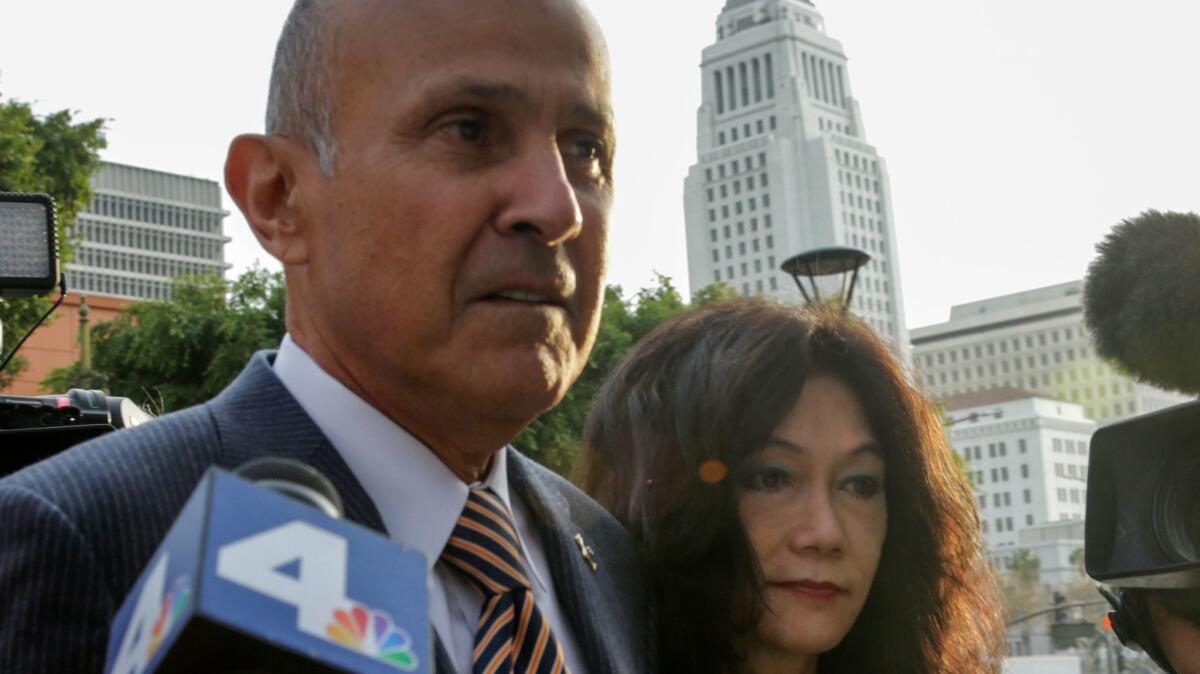What should California do with all its convicted cops?

- Share via
Who knew California had so many criminal police officers? Thanks to the reporting of a number of news outlets, we now know that around 80 active officers, and perhaps many more, were arrested, charged and convicted of crimes like domestic violence and drunk driving — but remain on the job, wearing badges, carrying weapons and enforcing laws, perhaps similar to the ones that they themselves broke.
That reporting has raised some difficult but important questions for lawmakers and local law enforcement leaders about who should be allowed to serve.
The convicted cops’ names were published online and in newspapers around the state last weekend as part of a series of stories that grew out of a 2018 request for public records, and a surprising and disturbing official response. The Los Angeles Times was not involved in the project, but we read the list and accompanying stories with great interest.
The data is collected and maintained at public expense by a state agency, the Commission on Peace Officer Standards and Training. Two reporters with the Investigative Reporting Program at UC Berkeley’s Graduate School of Journalism requested the information under the Public Records Act nearly a year ago, and POST complied.
But the reporters then got a letter from California Atty. Gen. Xavier Becerra’s office advising them that they had been sent the list by mistake and that even possessing the documents was a crime. The letter warned ominously of “legal action” if the reporters did not destroy the records.
To their credit, they didn’t. Instead, they and their partners from newspapers in the USA Today Network, MediaNews Group, McClatchy, Voice of San Diego and the Center for Investigative Reporting began the meticulous work of checking the POST data against court documents and news accounts, all of which are quite public and beyond Becerra’s overreach.
The names of several L.A. County sheriff’s deputies with criminal convictions had been reported by The Times in a series stories in 2017 on the department’s secret list of deputies tainted by past misconduct. The current project lists those stories as corroborating sources, along with other news stories around the state about other convictions and other cops. The information is out there, in court files and news archives, and is sorted by a state agency. It’s disappointing that the attorney general would try to suppress it. He instead ought to be a champion for increased transparency and availability of police records.
Under current law, no officer may serve if convicted of a felony. So any current cops with rap sheets were convicted only of misdemeanors, which are deemed less serious.
But many misdemeanors are also quite serious. Some lawmakers are now considering legislation to make any criminal conviction — felony or misdemeanor — disqualifying for law enforcement officers.
It’s tempting to believe that redrawing the line that separates fireable from non-fireable offenses would make police more accountable by removing a chief’s (or sheriff’s) discretion over officer discipline.
It wouldn’t. It would merely shift that discretion from chiefs to district attorneys, who would be the ones to decide whether a cop will be charged with a crime (something they do far too rarely). A better approach would be to determine which official — the chief or the prosecutor — is best positioned to proceed against an officer, and under what circumstances.
For less serious offenses, discretion ought to rest with the chief. Even when that less serious offense is a crime? Yes.
It is beyond question that law enforcement officers should be held to a higher standard of conduct than the general public, and it is equally clear that some misdemeanor convictions — domestic violence, for example — show a lack of fitness to serve.
But what about a so-called standard misdemeanor, like being drunk in public while off-duty? An officer may be convicted of that offense yet still be fit to serve after appropriate discipline, counseling and training. First-offense drunk driving is more serious, but perhaps the employment consequences of that crime, too, are best left to the internal police disciplinary system and not automatic dismissal.
Meanwhile, some types of misconduct — falsifying official reports, for example — can be so egregious that they ought to result in automatic firing whether or not district attorneys bring criminal charges.
Drawing a bright line can feel satisfying but is often not the simple fix it appears to be. That’s something lawmakers ought to keep in mind as they read the stories on officer crimes and decide how to proceed.
More to Read
A cure for the common opinion
Get thought-provoking perspectives with our weekly newsletter.
You may occasionally receive promotional content from the Los Angeles Times.









